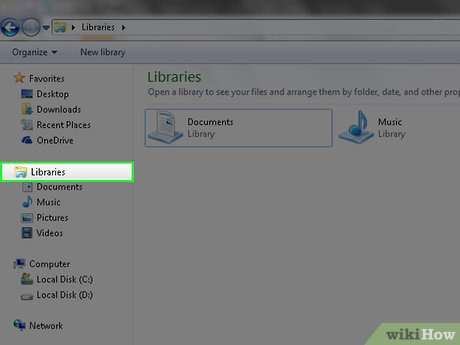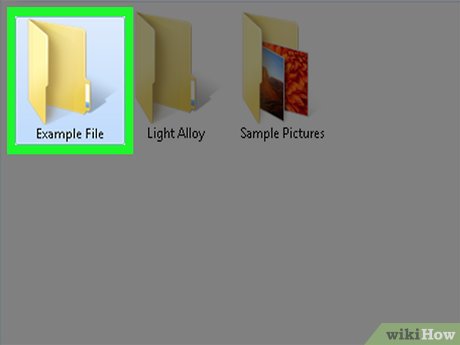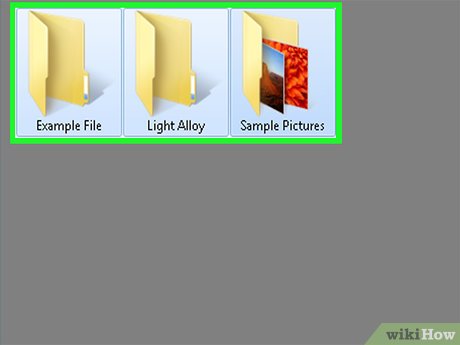How to Add a Folder to the Windows 7 File Index
Method 1 of 3:
Using the Libraries
-
 Understand how Windows libraries work. Libraries are collections of similar files and folders. Windows Search automatically indexes all of the folders that you've placed in a library. By default, this includes your Documents, Pictures, Music, and Videos folders. You can add additional folders to these preset libraries, or you can create new custom libraries which will be indexed as well.[1]
Understand how Windows libraries work. Libraries are collections of similar files and folders. Windows Search automatically indexes all of the folders that you've placed in a library. By default, this includes your Documents, Pictures, Music, and Videos folders. You can add additional folders to these preset libraries, or you can create new custom libraries which will be indexed as well.[1] -
 Find the folder that you want to add to a library. You can add any local or network folder to a library. Use Explorer to navigate your drives until you find the folder you want to index.
Find the folder that you want to add to a library. You can add any local or network folder to a library. Use Explorer to navigate your drives until you find the folder you want to index. -
 Right-click on the folder. You can select multiple folders in one location and then right-click the selection to add them all at once.
Right-click on the folder. You can select multiple folders in one location and then right-click the selection to add them all at once. -
 Select "Include in library". Another menu will appear listing your libraries.
Select "Include in library". Another menu will appear listing your libraries. -
 Choose the library you want to add the folder to. You can select from any of your existing libraries, or you can create a new library.
Choose the library you want to add the folder to. You can select from any of your existing libraries, or you can create a new library.- Adding a folder to a library does not move its location. The library entry is simply a "pointer" to the folder's actual location on the drive.
- It may take a while to index a large folder for the first time.
-
 Avoid adding too many folders. The point of the Search Index is to quickly access your most important files. If you add all of your folders to the index, you'll only slow down the search process. Try to keep your index limited to your essential files and folders.
Avoid adding too many folders. The point of the Search Index is to quickly access your most important files. If you add all of your folders to the index, you'll only slow down the search process. Try to keep your index limited to your essential files and folders.
Method 2 of 3:
Using the Indexing Options
-
 Open the Start menu. You can press ⊞ Win or click the Start menu.
Open the Start menu. You can press ⊞ Win or click the Start menu. -
 Type "indexing options" and select "Indexing Options" from the list of results. This launches the Indexing Options window. The folders you currently have indexed appear in the right frame.
Type "indexing options" and select "Indexing Options" from the list of results. This launches the Indexing Options window. The folders you currently have indexed appear in the right frame.- Indexing Options will not appear if Windows Search has been disabled. Open the Start menu and type "Windows Features". Select "Turn Windows features on or off" and wait for the list to load. Make sure that "Windows Search" is checked.[2]
-
 Click the "Modify" button. This allows you to add or remove folders from the index.
Click the "Modify" button. This allows you to add or remove folders from the index. -
 Expand the drives until you find the folder you want to add. The top frame contains an expandable tree for all of your connected and network locations. Use this to find the folder that you want to add to the index.
Expand the drives until you find the folder you want to add. The top frame contains an expandable tree for all of your connected and network locations. Use this to find the folder that you want to add to the index. -
 Check the box for each folder you are adding. Checking a box for a folder will automatically include any sub-folders as well. You can manually uncheck sub-folders that you don't want to include.
Check the box for each folder you are adding. Checking a box for a folder will automatically include any sub-folders as well. You can manually uncheck sub-folders that you don't want to include.- You can continue checking boxes to add more folders to the index.
- Avoid adding too many folders to the index. The purpose of the index is to speed up searching by checking your most-used files and folders first. If you add too many, the index will slow down, defeating its purpose.
-
 Click "OK" to save your changes. Your newly-selected folders will be added to the index. This can take a while for folders containing a large number of files.
Click "OK" to save your changes. Your newly-selected folders will be added to the index. This can take a while for folders containing a large number of files.- The Indexing Options window will display the progress for indexing the new folders.
Method 3 of 3:
Troubleshooting
-
 Know when you need to rebuild the index. If Windows Search is crashing your computer, or folders are not loading properly, your index database may be corrupted. Rebuilding it will delete the current index and rebuild it from scratch.
Know when you need to rebuild the index. If Windows Search is crashing your computer, or folders are not loading properly, your index database may be corrupted. Rebuilding it will delete the current index and rebuild it from scratch. -
 Open the Indexing Options window. Click the Start button and type "indexing options". Select "Indexing Options" from the list of results.
Open the Indexing Options window. Click the Start button and type "indexing options". Select "Indexing Options" from the list of results. -
 Click the "Advanced" button. This will open the advanced options for your Windows Search index.
Click the "Advanced" button. This will open the advanced options for your Windows Search index.- You will need administrator access to open this menu.
-
 Click "Rebuild". This will delete the current index and rebuild it using the folders you've specified. This may take a while if you are indexing a lot of files.
Click "Rebuild". This will delete the current index and rebuild it using the folders you've specified. This may take a while if you are indexing a lot of files.
Share by
Jessica Tanner
Update 04 March 2020















